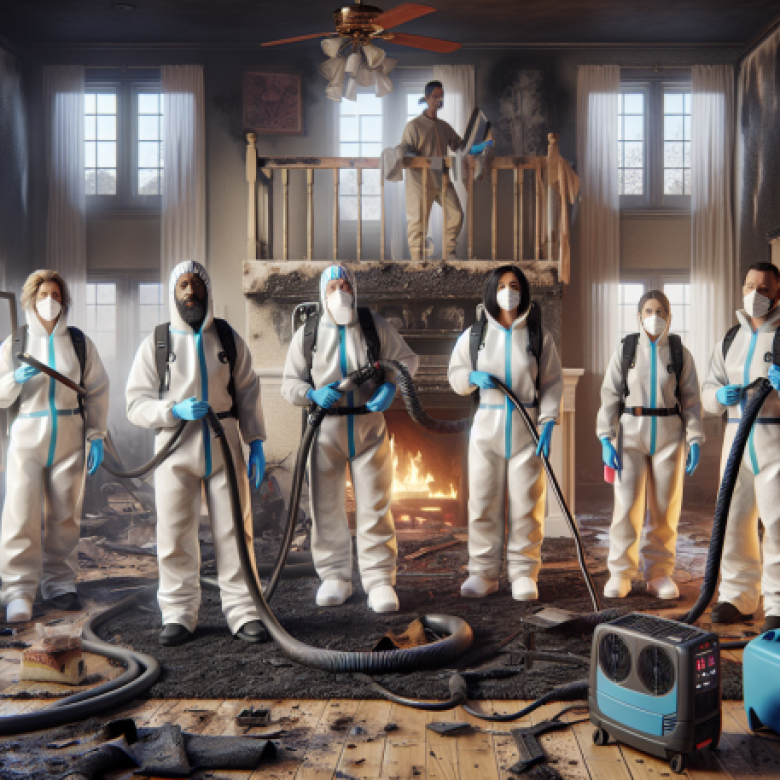Understanding the importance of fire safety is crucial for commercial property owners. It not only ensures the safety of the occupants but also helps to prevent significant property damage. Projekt Property Restoration, a leading company with over 16 years of experience in property restoration, offers a comprehensive guide on fire safety for commercial property owners. This guide aims to provide valuable insights into preventing fire hazards, implementing effective safety measures, and restoring properties affected by fire damage.
Our team of experts specializes in fire damage restoration, quickly mitigating the affected area and recovering as much property as possible. We also offer services such as water damage restoration, mold remediation, biohazard clean up, and reconstruction. Our commitment to customer satisfaction, 24/7 availability, and competitive pricing sets us apart in the industry.
In this guide, we will cover essential topics such as fire safety regulations, fire prevention strategies, emergency preparedness, and the role of insurance in fire damage restoration. We will also share tips and best practices from our extensive experience in the field.
Whether you are a seasoned commercial property owner or a new entrant in the market, this guide will equip you with the knowledge and resources to effectively manage fire safety in your properties. Remember, a well-prepared property owner is the best defense against fire hazards.
Stay tuned for more informative content from Projekt Property Restoration, your trusted partner in property restoration and fire safety.
Understanding the Importance of Fire Safety Measures in Commercial Properties
Fire safety is a critical concern for commercial property owners. It is not just about adhering to regulations and avoiding penalties, but it is also about protecting lives, assets, and the continuity of business operations. The National Fire Protection Association (NFPA) reports that U.S. fire departments responded to an estimated average of 3,340 fires in office properties per year from 2007-2011. These fires caused an annual average of four deaths, 44 injuries, and $112 million in direct property damage.
Understanding the importance of fire safety measures in commercial properties begins with recognizing the potential risks and hazards. These can range from electrical faults, flammable materials, and human error, to more complex issues like inadequate fire safety systems or lack of proper evacuation plans.
Implementing effective fire safety measures can significantly reduce these risks. These measures include installing and maintaining fire detection and suppression systems, ensuring proper storage and handling of flammable materials, providing adequate training to employees, and developing a comprehensive fire emergency plan.
Fire detection and suppression systems are the first line of defense in case of a fire. These systems, which include smoke detectors, fire alarms, and sprinkler systems, can detect a fire in its early stages and help control it until the fire department arrives. Regular maintenance of these systems is crucial to ensure their functionality. For instance, fire damage restoration services can help restore these systems to their optimal condition after a fire incident.
Proper storage and handling of flammable materials is another critical fire safety measure. This involves storing such materials in designated areas away from ignition sources and ensuring that they are handled safely during use.
Employee training is also a vital aspect of fire safety. Employees should be trained on how to respond in case of a fire, including how to use fire extinguishers, how to evacuate safely, and where to assemble after evacuation. They should also be trained on how to prevent fires, such as by avoiding overloading electrical outlets and reporting any potential fire hazards.
A comprehensive fire emergency plan is the backbone of fire safety measures. This plan should outline the procedures to follow in case of a fire, including evacuation routes, assembly points, and roles and responsibilities of employees. It should also include procedures for reporting fires and for liaising with the fire department.
In addition to these measures, commercial property owners should also consider investing in fire safety consulting services. These services can provide expert advice on how to improve fire safety measures and can help ensure compliance with fire safety regulations. For instance, consulting services can provide a thorough assessment of a property’s fire safety measures and recommend improvements.
In conclusion, understanding the importance of fire safety measures in commercial properties is crucial for protecting lives, assets, and business continuity. By implementing effective fire safety measures and investing in professional fire safety services, commercial property owners can significantly reduce the risk of fire incidents and ensure a safe and secure environment for their employees and customers.
- National Fire Protection Association. (2013). Structure Fires in Office Properties. Retrieved from https://www.nfpa.org/News-and-Research/Data-research-and-tools/Building-and-Life-Safety/Structure-Fires-in-Office-Properties
- Occupational Safety and Health Administration. (n.d.). Evacuation Plans and Procedures eTool. Retrieved from https://www.osha.gov/SLTC/etools/evacuation/
Implementing Effective Fire Safety Protocols for Commercial Property Owners
Fire safety is a critical concern for commercial property owners. The potential for loss of life, property damage, and financial ruin due to a fire is a risk that no business owner can afford to take. Implementing effective fire safety protocols can significantly reduce these risks and ensure the safety of employees, customers, and assets.
The first step in implementing effective fire safety protocols is to conduct a comprehensive fire risk assessment. This involves identifying potential fire hazards, assessing the people who may be at risk, and evaluating the existing fire safety measures. The fire risk assessment should be carried out by a competent person, such as a professional fire safety consultant. If you need assistance with this, consulting services are available to help you navigate this process.
Once the fire risk assessment is complete, the next step is to develop a fire safety policy. This policy should outline the responsibilities of all staff members in preventing fires and responding to fire emergencies. It should also include procedures for regular fire safety training and drills. Regular training and drills will ensure that all staff members are familiar with the fire safety procedures and can respond effectively in the event of a fire.
In addition to the fire safety policy, a fire emergency plan should be developed. This plan should include details on how to raise the alarm, how to evacuate the building, where to assemble after evacuation, and who to contact in the event of a fire. The fire emergency plan should be clearly communicated to all staff members and displayed in a prominent location.
Another crucial aspect of fire safety is the installation and maintenance of fire safety equipment. This includes fire extinguishers, fire alarms, and sprinkler systems. Regular inspections and maintenance of this equipment are essential to ensure that they are in good working order. If you need assistance with this, fire damage restoration services are available to help you maintain your fire safety equipment.
In addition to the above measures, commercial property owners should also consider implementing fire safety measures specific to their type of business. For example, restaurants should have a kitchen fire suppression system, while warehouses should have adequate fire separation between stored goods.
Finally, it’s important to remember that fire safety is an ongoing commitment. Regular reviews and updates of the fire safety protocols are necessary to ensure that they remain effective. This includes reviewing and updating the fire risk assessment, fire safety policy, and fire emergency plan, as well as conducting regular fire safety training and drills.
In conclusion, implementing effective fire safety protocols is a critical responsibility for commercial property owners. By conducting a comprehensive fire risk assessment, developing a fire safety policy and a fire emergency plan, installing and maintaining fire safety equipment, and conducting regular reviews and updates, commercial property owners can significantly reduce the risk of fire and ensure the safety of their employees, customers, and assets. If you need assistance with any aspect of fire safety, contact us today. We are here to help you protect your business from the devastating effects of fire.
In conclusion, fire safety is an essential aspect that every commercial property owner should prioritize. Not only does it protect the property and investments, but it also safeguards the lives of employees, customers, and visitors. By implementing the recommended fire safety measures, conducting regular inspections, and training staff on emergency procedures, commercial property owners can significantly reduce the risk of fire incidents. Remember, fire safety is not a one-time event but a continuous process that requires diligence and commitment. Stay informed, stay prepared, and ensure your commercial property is a safe environment for everyone.





